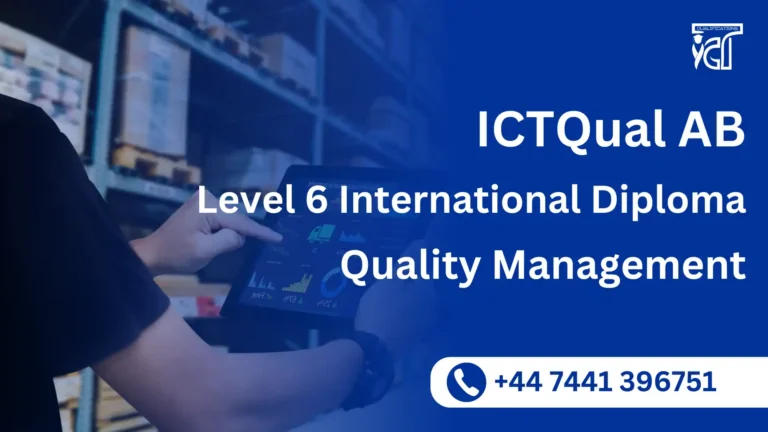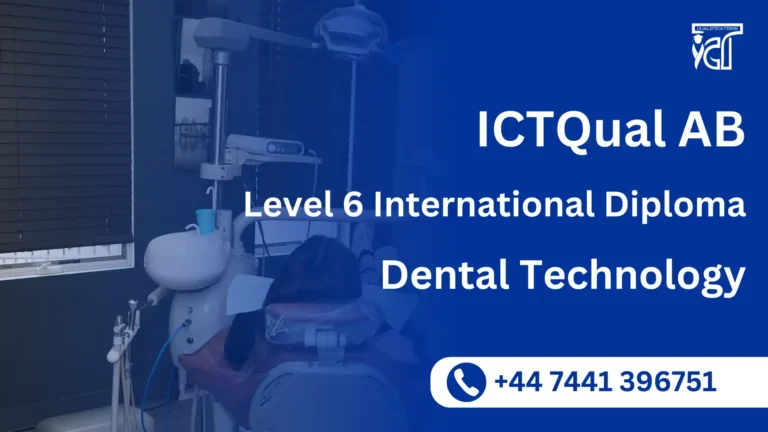The ICTQual AB Level 6 International Diploma in LNG (Liquefied Natural Gas) Technology is a globally recognised qualification designed to provide learners with advanced expertise in the fast-growing field of liquefied natural gas. Structured over three years and carrying a comprehensive 360-credit framework, this diploma is ideally suited for both fresh learners aspiring to enter the energy sector and professionals looking to strengthen their career prospects through specialised knowledge.
As energy markets around the world continue to shift towards cleaner and more efficient solutions, LNG has emerged as a vital part of global energy supply. The ICTQual AB Level 6 International Diploma in LNG (Liquefied Natural Gas) Technology offers learners a deep understanding of LNG production, storage, transportation, safety management and sustainability practices. By blending theoretical knowledge with practical, industry-relevant applications, the programme prepares learners to handle the complexities of LNG operations, project development and energy infrastructure management with confidence.
Graduates of this diploma gain a competitive advantage in securing roles across energy corporations, oil and gas companies, engineering consultancies and sustainability-focused projects. The ICTQual AB Level 6 International Diploma in LNG (Liquefied Natural Gas) Technology supports international mobility and progression into leadership positions, enabling learners to thrive in one of the most dynamic and strategically important areas of the energy sector.
With its flexible, assignment-based structure, the programme allows learners to study at their own pace from anywhere in the world while acquiring the skills and recognition required to succeed. Whether you are beginning your journey in energy or enhancing your existing career, the ICTQual AB Level 6 International Diploma in LNG (Liquefied Natural Gas) Technology provides the professional credibility, industry knowledge and long-term opportunities needed to excel in the global LNG industry.
ICTQual AB Level 6 International Diploma in LNG (Liquefied Natural Gas) Technology
This qualification, the ICTQual AB Level 6 International Diploma in LNG (Liquefied Natural Gas) Technology, consists of 36 mandatory units.
Year 1 – Foundation in LNG Technology
- Principles of Chemical and Process Engineering
- Introduction to Liquefied Natural Gas (LNG)
- Natural Gas Properties and Analysis
- LNG Production Processes Overview
- Cryogenic Principles and Applications
- Heat and Mass Transfer in LNG Systems
- Introduction to LNG Plant Equipment and Technology
- Process Instrumentation and Control Basics
- Health, Safety, and Environmental Awareness
- Industrial Laboratory Techniques
- Technical Report Writing
- Introduction to LNG Simulation Software
Year 2 – Intermediate LNG Technology
- Advanced LNG Liquefaction Processes
- Gas Pretreatment and Sweetening Techniques
- Refrigeration Cycles and Cryogenic Operations
- Process Control and Automation in LNG Plants
- Energy Management and Efficiency in LNG Operations
- LNG Storage and Tank Design
- Process Safety Management and Hazard Analysis
- LNG Transportation and Pipeline Technology
- Quality Control and Assurance in LNG Production
- Environmental Management and Sustainability
- LNG Blending and Product Optimisation
- Data Analysis and Technical Communication
Year 3 – Advanced LNG Technology
- Advanced LNG Plant Optimisation and Troubleshooting
- LNG Project Management and Planning
- Advanced Cryogenic Engineering and Heat Exchangers
- LNG Process Simulation and Modelling
- Corrosion, Maintenance, and Reliability in LNG Systems
- Energy Transition and Cleaner LNG Technologies
- Risk Assessment and Emergency Response
- Advanced Laboratory Techniques and Process Testing
- Supply Chain and Logistics in LNG Operations
- Capstone Project in LNG Technology
- Professional Development and Leadership in Energy
- Strategic Decision-Making in LNG Plant Management
Learning Outcomes for the ICTQual AB Level 6 International Diploma in LNG (Liquefied Natural Gas) Technology:
Year 1 – Foundation in LNG Technology
Principles of Chemical and Process Engineering
- Understand fundamental chemical and process engineering principles applied in LNG operations.
- Analyse material and energy balances within LNG processes.
- Apply engineering concepts to basic LNG plant operations.
Introduction to Liquefied Natural Gas (LNG)
- Comprehend the LNG industry structure, workflow, and applications.
- Identify key LNG processes and technologies.
- Explain the stages of natural gas liquefaction and utilisation.
Natural Gas Properties and Analysis
- Examine physical and chemical properties of natural gas.
- Conduct laboratory analysis to characterise gas composition.
- Interpret analytical data for operational and process decisions.
LNG Production Processes Overview
- Identify key LNG production processes and their interconnections.
- Understand operational principles for each production unit.
- Recognise the role of production processes in overall plant efficiency.
Cryogenic Principles and Applications
- Understand cryogenic science and low-temperature technology in LNG.
- Apply cryogenic principles to liquefaction and storage operations.
- Analyse the impact of temperature and pressure on LNG processes.
Heat and Mass Transfer in LNG Systems
- Understand heat and mass transfer fundamentals in LNG processes.
- Apply principles to process equipment and energy systems.
- Solve basic engineering problems related to thermal and material flows.
Introduction to LNG Plant Equipment and Technology
- Identify major LNG plant equipment and technology applications.
- Understand operational roles of compressors, heat exchangers, and pumps.
- Apply knowledge of equipment function to basic plant operations.
Process Instrumentation and Control Basics
- Recognise common instrumentation and control systems in LNG plants.
- Understand basic control loops for process stability.
- Apply monitoring techniques to maintain operational efficiency.
Health, Safety, and Environmental Awareness
- Identify hazards in LNG production and storage operations.
- Apply safety regulations, risk mitigation, and emergency procedures.
- Promote environmentally responsible practices in LNG facilities.
Industrial Laboratory Techniques
- Conduct laboratory tests for LNG and associated processes.
- Apply standard procedures for sample collection, handling, and analysis.
- Use laboratory data to inform process optimisation.
Technical Report Writing
- Develop professional report writing skills for LNG operations.
- Communicate operational, analytical, and experimental results clearly.
- Apply correct formatting, referencing, and scientific structure.
Introduction to LNG Simulation Software
- Gain basic proficiency in LNG process simulation tools.
- Model simple LNG processes to predict operational outcomes.
- Use simulation results to support decision-making and process analysis.
Year 2 – Intermediate LNG Technology
Advanced LNG Liquefaction Processes
- Apply advanced liquefaction techniques for efficient natural gas processing.
- Analyse process parameters to optimise output and energy consumption.
- Identify and resolve operational challenges in liquefaction units.
Gas Pretreatment and Sweetening Techniques
- Understand methods for gas purification, removing impurities and contaminants.
- Monitor and optimise sweetening processes to meet quality standards.
- Apply knowledge to maintain safe and efficient plant operations.
Refrigeration Cycles and Cryogenic Operations
- Understand refrigeration cycle principles in LNG liquefaction.
- Analyse cryogenic system performance for energy efficiency.
- Optimise operational parameters to maintain process stability.
Process Control and Automation in LNG Plants
- Implement advanced control strategies in LNG operations.
- Use automation systems to enhance efficiency and reduce operational risk.
- Analyse process data for continuous improvement.
Energy Management and Efficiency in LNG Operations
- Identify energy consumption patterns in LNG plants.
- Apply strategies to reduce waste and improve operational efficiency.
- Monitor and optimise energy usage across the facility.
LNG Storage and Tank Design
- Understand LNG storage principles and tank design specifications.
- Analyse thermal insulation and containment requirements.
- Apply safety measures and operational standards for storage systems.
Process Safety Management and Hazard Analysis
- Apply safety management systems in LNG operations.
- Conduct hazard identification, risk assessments, and mitigation strategies.
- Promote a culture of safety and compliance in operational teams.
LNG Transportation and Pipeline Technology
- Understand LNG transportation methods, including pipelines and LNG carriers.
- Analyse logistics and safety requirements for transportation.
- Apply knowledge to ensure safe and efficient distribution.
Quality Control and Assurance in LNG Production
- Implement quality standards and inspection procedures.
- Analyse product specifications to ensure compliance.
- Apply corrective actions to maintain consistent quality.
Environmental Management and Sustainability
- Identify environmental impacts of LNG operations.
- Implement sustainable practices and regulatory compliance.
- Promote environmental stewardship and energy efficiency.
LNG Blending and Product Optimisation
- Understand LNG blending techniques for different applications.
- Analyse product quality and compatibility.
- Apply optimisation strategies to meet specifications and market requirements.
Data Analysis and Technical Communication
- Interpret process and operational data effectively.
- Develop technical reports, presentations, and documentation.
- Use data insights to improve operational performance and decision-making.
Year 3 – Advanced LNG Technology
Advanced LNG Plant Optimisation and Troubleshooting
- Apply advanced techniques to optimise LNG plant performance.
- Identify operational bottlenecks and implement solutions.
- Enhance efficiency, safety, and product quality through systematic analysis.
LNG Project Management and Planning
- Plan and manage LNG projects from concept to execution.
- Allocate resources, manage timelines, and mitigate risks.
- Evaluate project outcomes and implement best practices.
Advanced Cryogenic Engineering and Heat Exchangers
- Analyse cryogenic system design and heat exchanger performance.
- Optimise heat transfer efficiency in low-temperature operations.
- Troubleshoot cryogenic equipment issues for operational stability.
LNG Process Simulation and Modelling
- Use advanced simulation tools for process design and optimisation.
- Model complex LNG operations to predict plant performance.
- Apply simulations to support strategic decision-making.
Corrosion, Maintenance, and Reliability in LNG Systems
- Understand causes and prevention of corrosion in cryogenic systems.
- Develop maintenance strategies to enhance equipment longevity.
- Ensure reliability and safety through inspection and repair protocols.
Energy Transition and Cleaner LNG Technologies
- Evaluate sustainable technologies and low-emission practices.
- Apply cleaner energy solutions to reduce environmental impact.
- Analyse integration of renewable technologies in LNG operations.
Risk Assessment and Emergency Response
- Conduct comprehensive risk assessments for LNG processes.
- Develop emergency response and contingency plans.
- Apply mitigation strategies to ensure operational safety.
Advanced Laboratory Techniques and Process Testing
- Perform high-level laboratory analyses for LNG operations.
- Apply testing results to refine process parameters.
- Ensure laboratory data informs operational and strategic decisions.
Supply Chain and Logistics in LNG Operations
- Analyse supply chain processes for LNG feedstock and products.
- Optimise logistics, storage, and distribution strategies.
- Integrate operational planning with supply chain management.
Capstone Project in LNG Technology
- Conduct an in-depth project integrating knowledge from all units.
- Solve real-world LNG operational challenges using analytical and practical skills.
- Present findings and recommendations professionally.
Professional Development and Leadership in Energy
- Develop leadership, communication, and management skills.
- Enhance teamwork, decision-making, and strategic thinking.
- Prepare for senior roles in operational and technical management.
Strategic Decision-Making in LNG Plant Management
- Apply analytical and strategic tools for operational decision-making.
- Evaluate operational, financial, and environmental factors.
- Implement strategies for long-term efficiency, safety, and sustainability.
The ICTQual AB Level 6 International Diploma in LNG (Liquefied Natural Gas) Technology offers learners a comprehensive pathway to success in one of the most critical and fast-growing areas of the global energy sector. With its three-year, 360-credit structure, this programme not only builds advanced technical knowledge but also enhances professional credibility, opening doors to diverse international career opportunities. Learners benefit from a flexible study model, global recognition, and the practical skills needed to excel in the LNG industry.
1. Global Industry Recognition
- Qualification designed to meet international energy sector standards.
- Enhances employability across leading LNG and energy organisations.
- Provides credibility for both local and overseas career pathways.
2. Career Advancement Opportunities
- Prepares learners for senior roles in LNG operations and management.
- Supports progression into consultancy, project leadership, and technical expertise.
- Creates opportunities in global oil, gas, and renewable energy companies.
3. Practical and Applied Knowledge
- Focus on LNG production, storage, transportation, and safety.
- Industry-relevant skills that can be directly applied in real-world contexts.
- Equips learners with tools to manage energy projects and infrastructure.
4. Flexible Learning Experience
- Assignment-based structure suitable for international learners.
- Study at your own pace while balancing work and personal commitments.
- Accessible from anywhere in the world without relocation requirements.
5. Long-Term Career Growth
- Builds a strong foundation for leadership and specialised roles.
- Expands professional networks in the global energy industry.
- Supports sustainable career progression with future-focused expertise.
The ICTQual AB Level 6 International Diploma in LNG (Liquefied Natural Gas) Technology is designed for motivated learners who wish to establish or advance their careers in the global energy sector. Whether entering the field for the first time or seeking to enhance existing expertise, this programme provides the flexibility, recognition, and knowledge required to achieve professional goals in LNG and related industries.
1. Aspiring Energy Professionals
- Fresh learners aiming to begin a career in the oil, gas, or LNG sector.
- Individuals seeking to enter a high-demand and globally relevant industry.
- Those who want a recognised qualification to start their professional journey.
2. Experienced Industry Practitioners
- Professionals with a background in energy, oil, or gas looking to expand their expertise.
- Learners who want to strengthen their technical and managerial knowledge.
- Candidates seeking international recognition to enhance career mobility.
3. Career Changers and Ambitious Learners
- Individuals from different industries wishing to transition into LNG and energy.
- Learners eager to develop new skills and enter a growing global sector.
- Professionals aiming to reposition their careers towards sustainable energy solutions.
4. Future Leaders and Innovators
- Learners aspiring to move into supervisory, managerial, or consultancy roles.
- Individuals who wish to lead energy projects and drive innovation.
- Candidates seeking qualifications that build credibility for leadership opportunities.
5. International Learners Seeking Flexibility
- Learners from any part of the world looking for a flexible study option.
- Those who need an assignment-based structure to balance work and study.
- Candidates who want a qualification accessible without geographical limitations.
Upon completing the ICTQual AB Level 6 International Diploma in LNG (Liquefied Natural Gas) Technology learners gain a strong foundation to advance in one of the most dynamic sectors of the global energy industry. The ICTQual AB Level 6 International Diploma in LNG (Liquefied Natural Gas) Technology equips learners with technical expertise, managerial skills, and international credibility, enabling them to pursue higher-level responsibilities, specialised roles, and strategic positions in energy organisations. Whether aiming for leadership roles, project management, or consultancy positions, learners are well-prepared to drive innovation and contribute to sustainable energy solutions worldwide.
1. Senior Operations and Technical Roles
- Progress into senior positions within LNG production, storage, and transportation teams.
- Manage complex operational projects and ensure compliance with safety and efficiency standards.
- Oversee technical teams and operational workflows in energy facilities.
2. Project Management and Consultancy
- Lead energy projects from planning to execution.
- Provide consultancy services in LNG operations, infrastructure, and sustainability.
- Apply advanced skills in risk assessment, logistics, and strategic planning.
3. Leadership and Supervisory Opportunities
- Transition into supervisory and managerial positions in global energy companies.
- Develop leadership skills to manage cross-functional teams.
- Contribute to organisational growth and innovation in LNG and related sectors.
4. Specialisation in LNG and Energy Technologies
- Focus on niche areas such as renewable integration, safety management, or energy sustainability.
- Build expertise to address industry-specific challenges and innovations.
- Enhance employability in technical and specialised roles worldwide.
5. International Career Mobility
- Open doors to employment opportunities across global energy markets.
- Benefit from international recognition and transferable skills.
- Position yourself for long-term career growth and global energy leadership roles.
As an approved centre of ICTQual AB, we offer learners two clear pathways to achieve the internationally recognised Level 6 Diploma in LNG Technology. These routes are designed to accommodate both experienced professionals and fresh learners, ensuring flexibility while maintaining high academic and industry standards.
Route 1: Experienced Professionals
- Designed for learners with at least six years of verifiable industry experience in LNG, oil, gas, or related sectors.
- Allows learners to leverage practical knowledge to complete the programme efficiently.
- Provides formal recognition of industry expertise alongside completion of key assignments.
- Enables fast-tracking of certification for career advancement.
Route 2: Fresh Learners
- Ideal for learners new to the LNG or energy sector.
- Requires completion of 36 comprehensive assignments covering LNG technology, operations, safety management, and sustainability.
- Ensures learners develop both theoretical knowledge and practical skills.
- Prepares learners for successful entry into the global energy industry.
Enrolment through an Approved Centre
- All learners must enrol through our approved ICTQual AB centre.
- Provides full access to professional guidance, learning resources, and dedicated support.
- Ensures learners receive expert assistance to complete assignments and achieve the qualification.
- Suitable for both experienced professionals and fresh entrants aiming for international recognition.
Entry Requirements
The ICTQual AB Level 6 International Diploma in LNG (Liquefied Natural Gas) Technology is designed to accommodate both fresh learners and experienced professionals, providing clear entry criteria to ensure learners are well-prepared for advanced study.
Minimum Age
- Learners must be at least 18 years old to enrol in this programme.
Educational Background
- A high school diploma or equivalent is typically required for fresh learners.
- For learners with prior higher education or relevant industry qualifications, recognition of prior learning may be considered.
Professional Experience
- Route 1 (Experienced Professionals): Learners should have a minimum of six years of verifiable experience in LNG, oil, gas, or related sectors.
- Route 2 (Fresh Learners): No prior industry experience is required; learners will complete 36 comprehensive assignments to gain full competency.
Language Proficiency
- Learners must have proficient English language skills to complete assignments and assessments successfully.
- For non-native English speakers, an IELTS score of 5.5 or equivalent is recommended, or evidence of prior education in English.
This structured entry framework ensures that learners, whether new to the LNG sector or experienced professionals, are fully prepared to succeed in this internationally recognised Level 6 qualification.
Register Now
Qualification Process
Qualification Process for the ICTQual AB Level 6 International Diploma in LNG (Liquefied Natural Gas) Technology
- Self-Assessment:
Begin by evaluating your eligibility to ensure you meet the qualification requirements, including work experience, knowledge, and language proficiency. - Registration:
Complete your registration by submitting the required documents, including a scanned copy of a valid ID, and paying the registration fee. - Induction:
An assessor will conduct an induction to confirm your eligibility for the course and explain the evidence requirements. If you do not meet the criteria, your registration will be cancelled, and the fee will be refunded. - Assignments & Evidence Submission:
Provide all assignments and the necessary evidence based on the assessment criteria outlined in the course. If you are unsure of the required evidence, consult with the assessor for guidance on the type and nature of evidence needed. - Feedback and Revision:
The assessor will review your submitted evidence and provide feedback. Evidence that meets the criteria will be marked as “Criteria Met,” while any gaps will be identified. You will be asked to revise and resubmit if needed. - Competence Evidence:
Submit final evidence demonstrating that all learning outcomes have been met. This evidence will be marked as “Criteria Met” by the assessor once it is satisfactory. - Internal Quality Assurance (IQA):
The Internal Quality Assurance Verifier (IQA) will review your evidence to ensure consistency, quality, and compliance with standards. - External Verification:
The IQA will submit your portfolio to ICTQUAL AB External Quality Assurance Verifiers (EQA) for final confirmation. The EQA may contact you directly to verify the authenticity of your evidence. - Certification:
Upon successful completion of all checks, ICTQUAL AB will issue your official certificate, confirming that you have attained the ICTQual AB Level 6 International Diploma in Environmental Engineering and Management.







